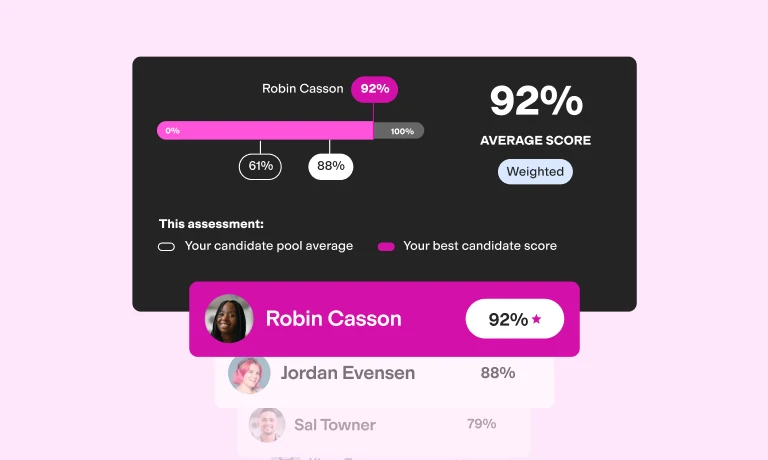ESTJs, or "Executives," shine when they're steering the ship with their top-notch organizational skills. But putting them in a chaotic environment can lead to dips in their morale, risking faster turnover, decreased productivity, and a potential mismatch with team dynamics.
Additionally, their assertiveness and preference for structure might not mesh well with more adaptable or imaginative colleagues, making the right role placement essential.
That’s where TestGorilla steps in. Our tailored personality tests and skill assessments help ensure ESTJs find their perfect fit, maximizing their leadership potential. This guide will give you the lowdown on spotting, attracting, and assessing these leaders effectively.
ESTJ Candidates: Key strengths, limitations, and personality traits
ESTJs, often referred to as the "Executives” of the 16 personality types, are recognized for their strong leadership qualities, organizational skills, and practical approach.
They excel in structured environments where they can apply their clear vision and decisiveness. But their preference for order and tradition may clash with highly fluid or unconventional settings.
Let's delve into the strengths and challenges of ESTJ types to understand this leadership-oriented personality better.
Key Strengths of ESTJ Types
Leadership and authority: Shine as authoritative figures, skillfully coordinating teams and resources to meet objectives with precision and efficiency.
Organizational skills: Exceptionally good at creating order, planning out tasks, and setting clear objectives.
Dedication and reliability: Known for their strong sense of duty, they are dependable and take their commitments seriously.
Pragmatic approach: Practical in their problem-solving, preferring tried-and-tested methods over theoretical concepts.
Direct communication: Value honesty and directness, ensuring clear and straightforward interactions.
Challenges for ESTJ Types
Rigidity in thinking: May struggle with flexibility, finding it hard to adapt to new methods that deviate from the conventional.
Impatience with ambiguity: Can become impatient or uncomfortable in situations that lack clear direction or structure.
Difficulty in emotional situations: Might find it challenging to navigate scenarios that require a high degree of empathy or emotional sensitivity.
Resistance to change: Tend to be wary of change, especially if it challenges established norms or procedures.
Perceived as too authoritative: Their strong leadership style can sometimes come off as overly assertive or domineering.
Personality Traits of ESTJ Types
ESTJs are driven and decisive, thriving in roles that allow them to establish structure and lead teams towards tangible outcomes. They approach tasks with a logical and methodical mindset, valuing efficiency and productivity.
In project management, an ESTJ would prioritize clear timelines, defined roles, and measurable goals. They lead projects with an emphasis on accountability and high standards.
Their knack for strategic planning and keen attention to detail makes them invaluable in teams, particularly in roles that require strong leadership, meticulous organization, and a pragmatic approach.
What ESTJ applicants look for in a workplace
To attract ESTJ candidates, it's crucial to understand their workplace preferences and values. Here are four key factors that resonate with them.
Structured environment and clear hierarchies
ESTJs are drawn to roles offering clear structures and well-defined leadership hierarchies. They flourish in environments where responsibilities and expectations are explicitly outlined.
In your job descriptions, emphasize the organized nature of your workplace. Share examples of successful projects that were achieved through disciplined planning and execution. During interviews, discuss the company's structured approach to project management and decision-making, highlighting how ESTJs can fit into and lead within this framework.
Mention specific examples, like a project that required meticulous planning and coordination, demonstrating the value your company places on structured leadership and organizational skills.
Goal-oriented projects and measurable outcomes
ESTJs are motivated by tangible goals and measurable outcomes. They prefer workplaces that set clear objectives and reward achievements.
When recruiting, highlight the goal-oriented aspect of the role by detailing how it involves setting, pursuing, and achieving specific targets. For example, you could describe a recent challenge where the team had to meet ambitious sales targets, leading to a significant increase in market share.
Share instances where strategic planning and efficiency led to notable successes, showcasing an environment where ESTJs' results-driven nature can thrive and be recognized.
Opportunities for leadership and advancement
ESTJs value opportunities to lead and advance within an organization. Showing clear pathways for career progression can be highly attractive to them.
During the recruitment process, outline potential career paths within the company and examples of employees who have risen to leadership positions through merit and hard work. This demonstrates to ESTJ candidates that your company values ambition and offers avenues for professional growth.
Practical and efficient work practices
Executives appreciate practicality and efficiency in their work. Highlighting your company's commitment to streamlined processes and effective problem-solving will appeal to their pragmatic nature.
In discussions or job descriptions, detail specific instances where your company introduced innovative solutions, such as a new workflow that cut costs or a strategy that boosted product quality, to show your commitment to efficiency and problem-solving.
Highlighting these aspects demonstrates how your workplace matches ESTJ preferences for structure, leadership, and efficiency.
Collaborative yet autonomous work culture
ESTJs excel in settings where they can lead group efforts but also have the authority to make decisions and drive projects forward on their own terms. As a result, they’ll find roles that offer both collaboration and independence particularly appealing.
To draw them in, showcase opportunities where they can guide teams while still having the space to implement their own strategies and solutions.
The best insights on HR and recruitment, delivered to your inbox.
Biweekly updates. No spam. Unsubscribe any time.
How to assess ESTJ type candidates
Incorporating personality assessments into the hiring process offers valuable insights into your Executive candidates, yet understanding their job-specific skills is equally crucial.
Effective testing methods for ESTJ candidates
Once you've analyzed the results from a personality assessment like the 16 Personalities test, it's important to understand how an ESTJ's natural leadership qualities and organizational skills translate into job performance.
TestGorilla provides hundreds of pre-employment assessments designed to gauge leadership, strategic thinking, and role-specific abilities, crucial for evaluating an ESTJ's strengths.
For example, ESTJs excel in structured environments and leadership roles. TestGorilla's Leadership & People Management test helps identify candidates with a strong aptitude for leading teams, making decisions, and organizing resources effectively.
ESTJs are also known for their practical approach to problem-solving. The Project Management test evaluates a candidate's ability to plan, execute, and lead projects efficiently, aligning with an ESTJ's natural tendencies for order and execution.
To further assess their strategic thinking and deduction skills, consider using the Critical Thinking test. This test spots candidates capable of analyzing data and making informed decisions through their analytical abilities.
To assess their organizational skills, try TestGorilla’s Attention to Detail test. It measures a candidate’s ability to filter information, handle intricate processes, and maintain consistency during projects.
While gaining insights from personality tests is valuable, pairing them with skills-based evaluations provides a comprehensive view of a candidate's capabilities. TestGorilla's array of assessments offers a balanced approach, reducing unconscious biases that might tempt interviewers to favor candidates resembling themselves. This ensures ESTJ candidates are fairly evaluated on their abilities and traits.
Learn more about supporting ESTJ personality types in the workplace.
Find the ideal ESTJ leader with TestGorilla
ESTJs bring strong leadership and organizational skills to your team, but recognizing their preferences is key in the hiring process. Misplacing them in roles lacking structure or clear direction can hinder their efficiency and leadership potential.
TestGorilla offers a solution with a mix of personality and skills assessments, ensuring ESTJs are matched with roles that leverage their strengths, leading to job satisfaction and optimal performance. Explore our tools with a live demo, a product tour, or by signing up for a free account.
Related posts
You've scrolled this far
Why not try TestGorilla for free, and see what happens when you put skills first.


















